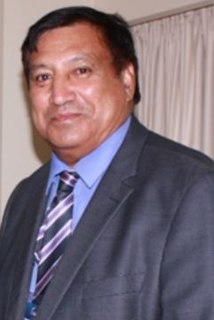
The politics of the Cook Islands, an associated state, takes place in a framework of a parliamentary representative democracy within a constitutional monarchy. The Queen of New Zealand, represented in the Cook Islands by the Queen's Representative, is the Head of State; the prime minister is the head of government and of a multi-party system. The Islands are self-governing in free association with New Zealand and are fully responsible for internal affairs. New Zealand retains some responsibility for external affairs, in consultation with the Cook Islands. In recent years, the Cook Islands have taken on more of its own external affairs; as of 2005, it has diplomatic relations in its own name with eighteen other countries. Executive power is exercised by the government, while legislative power is vested in both the government and the islands' parliament. The judiciary is independent of the executive and the legislatures.
Jim Marurai is a Cook Islands politician and former Prime Minister of the Cook Islands. He is a member of the Democratic Party.
The Democratic Party is a liberal political party in the Cook Islands. As a result of the 2018 Cook Islands election, it is currently the largest party in the Cook Islands Parliament.
The Cook Islands First Party was a political party in the Cook Islands. The party was originally a faction within the Cook Islands Democratic Party which supported Prime Minister Robert Woonton over Terepai Maoate. The 2004 elections saw the Democrats win a clear majority, but it was not clear whether Woonton would have the numbers within the party to remain Prime Minister. Woonton's announcement on 15 November 2004 that he was forming a coalition with the rival Cook Islands Party with himself as Prime Minister. This touched off a bitter struggle within the Democrats, which ultimately saw Woonton and his Health Minister Peri Vaevae Pare expelled from the party. Woonton responded by launching his own party, the Demo Tumu Party, on 1 December 2004.

General elections were held in the Cook Islands on September 27, 2006 in order to elect 24 MPs to the Cook Islands Parliament. The Democratic Party remained in power, winning 15 of 24 seats. A total of 8,497 voters turned out to vote.

General elections were held in the Cook Islands on 7 September 2004. Initial results showed the Democratic Party winning by a wide margin, but close results led to 11 electoral petitions being filed, delaying the date Parliament could sit until mid-December. In the interim, Prime Minister Robert Woonton announced that he was forming a coalition government with the rival Cook Islands Party. This led to a split within the Democrats, with Woonton and four other MPs leaving to form the Demo Tumu Party. With 14 MPs, the coalition had a comfortable majority in Parliament.

General elections were held in the Cook Islands in January, 1989 to elect 24 MPs to the Parliament. The elections saw the Cook Islands Party win 12 seats, the Democratic Tumu Party win 2 seats, and the Democratic Party-led opposition coalition win 9 seats. One seat was won by an independent. Following the elections, the Democratic Tumu Party supported the CIP, and Geoffrey Henry became Prime Minister for the second time.

General elections were held in the Cook Islands on 2 November 1983 to elect 24 MPs to the Parliament. The election was called as a result of the March, 1983 elections being overturned. The result was a coalition government, with Democratic Party leader Tom Davis becoming Prime Minister, with the Cook Islands Party's Geoffrey Henry as Deputy Prime Minister. Henry was later replaced with Dr Terepai Maoate.

General elections were held in the Cook Islands on 30 March 1978 to elect 22 MPs to the Parliament. The result was a victory for the Cook Islands Party under Albert Henry, but it later emerged that the CIP had flown hundreds of supporters from New Zealand to the Cook Islands at public expense in order to vote. The results of the election were challenged, and the election of eight MPs was overturned by the High Court. Albert Henry was subsequently convicted of conspiracy and misuse of public money and stripped of his knighthood.
Sir Terepai Tuamure Maoate, KBE was Prime Minister of the Cook Islands from 18 November 1999 to 11 February 2002. He was a member of the Cook Islands Democratic Party
Tangata Mouauri Vavia is a Cook Islands politician and former Cabinet Minister. He is a member of the Cook Islands Democratic Party.

General elections were held in the Cook Islands on 17 November 2010 in order to elect 24 MPs to the Cook Islands Parliament. The elections were won by the Cook Islands Party, which won 16 of the 24 seats. Voter turnout was 78%.

Sir Tom John Marsters, is the 7th Queen's Representative to the Cook Islands. He is a former Deputy Leader of the Cook Islands Party and Deputy Prime Minister of the Cook Islands.

Henry Tuakeu Puna is the Prime Minister of the Cook Islands. He is leader of the Cook Islands Party and has been Prime Minister since November 2010.
The Party Tumu is a political party in the Cook Islands. It was founded in July 2010 by Cook Islands Party MP Albert (Peto) Nicholas after a split over candidate selection. Originally known as the "Cook Islands party Tumu", the party was forced to rename itself after the CIP successfully sought a court injunction preventing them from using the name Cook Islands Party.
The New Alliance Party was a political party in the Cook Islands. The party was led by Norman George, and was a continuation of his Alliance Party.

General elections were held in the Cook Islands on 14 June 2018 to elect the 24 members of the 15th Cook Islands Parliament.







